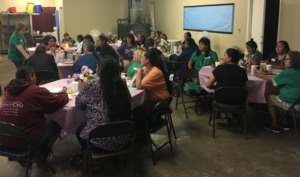Cooperation Can Start by Recognizing Everyone is Different
Michele Dempster | August 2018
Michele Dempster | August 2018
 Earlier this month I had the opportunity to participate in a trip with my church. The purpose of the trip was to hold a ladies Bible conference at two different Navajo/Apache reservation churches in Arizona. With eight people traveling together, cooperation was essential. We flew out on a Saturday, planning on having time that evening to finish preparing for the conference before it began Sunday evening. Unfortunately a five hour delay in the Dallas airport put us at our final destination after 10:00 p.m., which resulted in the need to completely revamp our plans for Sunday. Without cooperation, we would not have been able to complete all the necessary prep work before the start of the first evening. The collaboration in discussing what had to be accomplished before Sunday evening and what could wait until the next day required cooperation. Without listening to one another and working as a team, the mission and the plans could have faltered, or at the very least run less smoothly. The benefit of cooperation was evident throughout the week, but working under a tight timeline made it even more critical.
Earlier this month I had the opportunity to participate in a trip with my church. The purpose of the trip was to hold a ladies Bible conference at two different Navajo/Apache reservation churches in Arizona. With eight people traveling together, cooperation was essential. We flew out on a Saturday, planning on having time that evening to finish preparing for the conference before it began Sunday evening. Unfortunately a five hour delay in the Dallas airport put us at our final destination after 10:00 p.m., which resulted in the need to completely revamp our plans for Sunday. Without cooperation, we would not have been able to complete all the necessary prep work before the start of the first evening. The collaboration in discussing what had to be accomplished before Sunday evening and what could wait until the next day required cooperation. Without listening to one another and working as a team, the mission and the plans could have faltered, or at the very least run less smoothly. The benefit of cooperation was evident throughout the week, but working under a tight timeline made it even more critical.
Cooperation of like-minded people with the same purpose and goals makes coming together energizing and fulfilling. But what does cooperation look like when everyone’s thoughts and goals are not the same?
Cooperation can start by recognizing everyone is different. We are as different internally as we are externally. A person’s make-up is influenced not only by nature and nurture, but also by the choices made over their lifetime. We all have different personalities and different ways of communicating. And these differences affect how we relate to one another. And how we relate to one another affects our cooperation.
Cooperation can be achieved even when there is a difference of opinion. Key to cooperation is discussing differences in a respectful manner, with an open mind, and, where possible, finding common ground. Cooperation does not mean setting aside core values and what is important to you. But it does mean we manage our reactions and how we communicate. Our thoughts and attitudes not only affect us, but also affect those around us. If we focus on how much someone annoys us instead of focusing on how to best work with someone, it will come across in our attitudes and demeanor. If we do not choose our words and reactions wisely, we can not only hurt others but we can also negatively impact the process and the team.
Whether designing or selling a product or serving a need, working in cooperation with one another not only builds a comradery, it improves results. Together is better.
Originally published in the Owasso Reporter August 2018.

 Cooperation is Important to Survival
Cooperation is Important to Survival